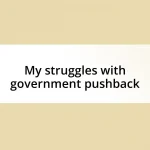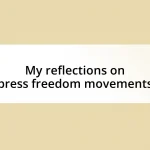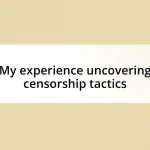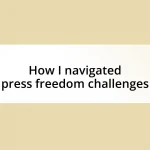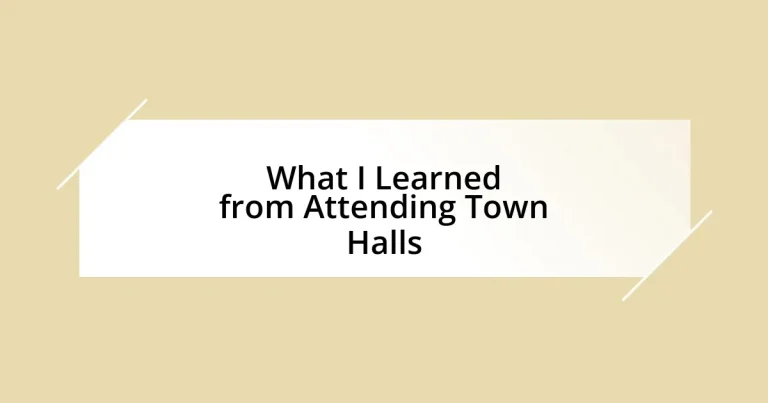Key takeaways:
- Town hall meetings provide a powerful platform for community engagement, allowing individuals to share personal stories that highlight the human impact of policies.
- Key benefits of attending include empowerment, informed decision-making, building connections, encouraging dialogue with officials, and developing empathy through shared experiences.
- Effective engagement with speakers enhances the experience; preparation and sharing personal anecdotes foster meaningful dialogue.
- Taking action after town halls, whether through organizing groups or volunteering, can lead to tangible changes and deepen community connections.
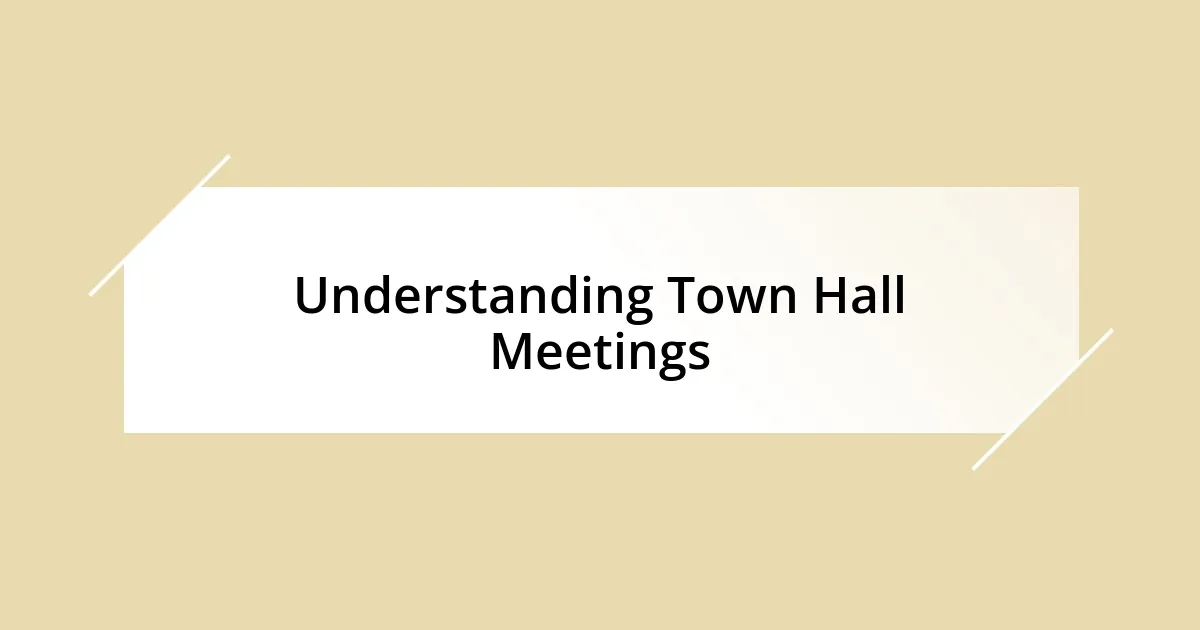
Understanding Town Hall Meetings
Town hall meetings are fascinating platforms for community engagement. The first time I attended one, I remember feeling an electric buzz in the room, filled with people eager to voice their concerns and ideas. It struck me how these gatherings serve not just as a space for information exchange but as a powerful reminder of our collective voice.
During these meetings, I often notice the diverse range of issues discussed, from local development projects to pressing social concerns. It makes me wonder: how often do we really take the time to express our opinions on matters that affect our lives? Each perspective shared opens a window into the community’s heart, illuminating the shared values and unique challenges we face together.
I’ve experienced firsthand the emotional weight of these conversations. When a resident stands up to share a personal story about the impact of a new law, it transcends the casual banter of everyday life. It brings home the realization that behind every statistic is a person—a reminder that our participation can shape the future. How can we ignore the call to be part of this dialogue?
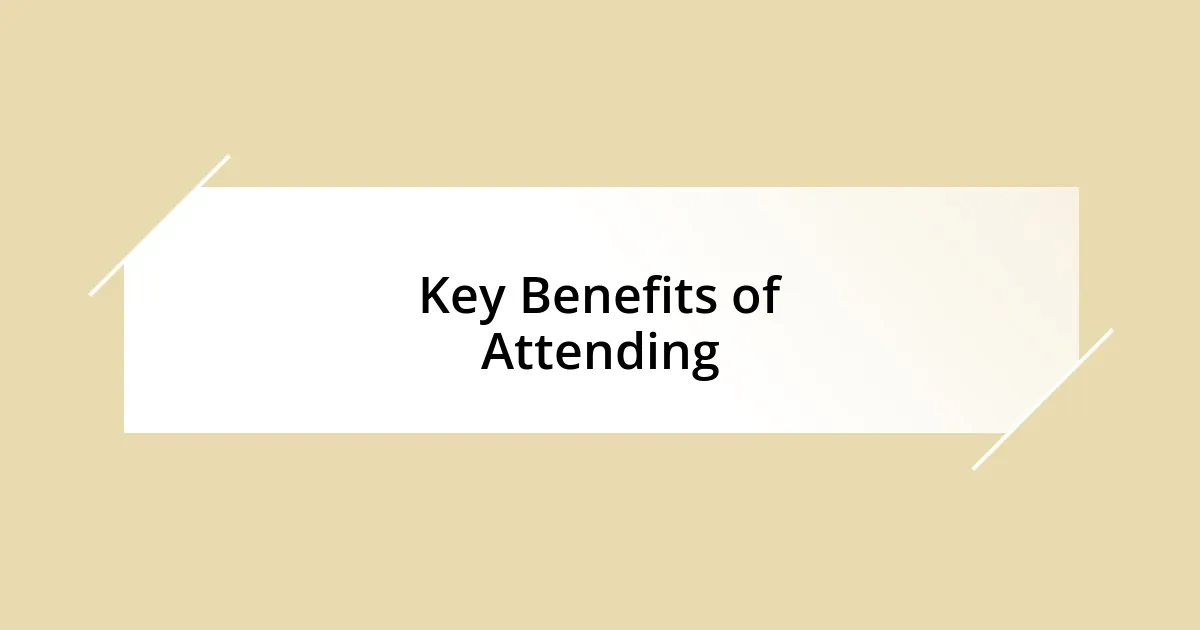
Key Benefits of Attending
Attending town halls has been transformative for me, providing unique insights into the pulse of my community. Each time I sit in those chairs, I find myself part of a dynamic exchange where the collective energy is palpable. It’s like standing on the edge of a vibrant conversation that can influence real change—watching people step up, share their experiences, and connect over shared struggles.
Here are some key benefits I’ve personally experienced from attending these meetings:
-
Empowerment: I feel more connected and empowered to voice my opinions. It’s uplifting to see how individuals can bring about change.
-
Informed Decision-Making: I leave with a richer understanding of local issues—a crucial factor when voting or participating in community initiatives.
-
Building Connections: I’ve met neighbors and community leaders whom I wouldn’t have encountered otherwise, fostering a sense of belonging.
-
Encouraging Direct Dialogue: It’s refreshing to converse with elected officials, asking questions that matter to me, which sometimes leads to unexpected solutions.
-
Personal Stories: Hearing others’ stories really touches me, reminding me of the humanity behind every policy decision. Each tale deepens my compassion and commitment to community improvement.
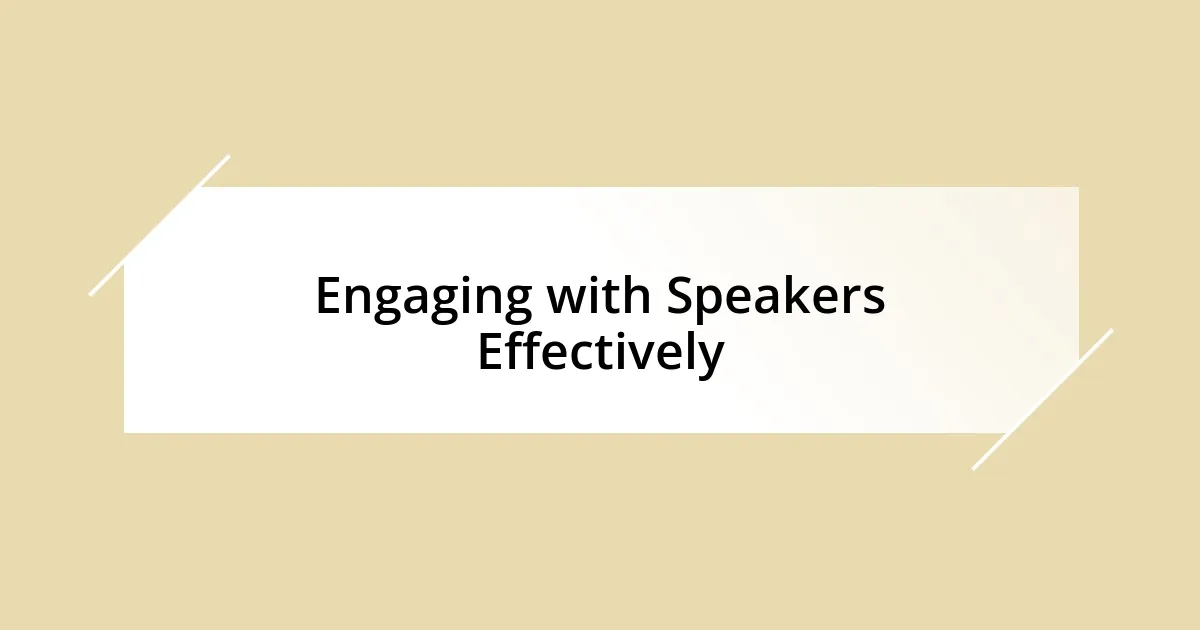
Engaging with Speakers Effectively
Engaging with speakers during town hall meetings is an art that can significantly enhance the experience. I remember one meeting where I nervously approached a local representative, wanting to discuss my concerns about public transportation. Instead of simply listing my points, I framed my question around a personal story from my daily commute. This approach opened the door to a more meaningful conversation, making it clear that my issues weren’t just abstract problems; they affected real lives.
Another time, an unexpected exchange happened when a speaker encouraged attendance from the audience. I raised my hand and shared my thoughts on neighborhood safety. The representative didn’t just acknowledge my input; he genuinely engaged, asking for specifics. This moment taught me the power of effective dialogue; it’s not just about having a voice but rather about being heard in a way that fosters understanding.
To effectively engage with speakers, being well-prepared is key. I often jot down my thoughts and potential questions prior to meetings. This not only gives me confidence but also helps me remain composed when articulating my thoughts. Reaching out for feedback after the session reinforces that this dialogue is ongoing and shows speakers that their engagement is impactful.
| Positive Engagement Techniques | Potential Pitfalls |
|---|---|
| Sharing personal anecdotes | Generalizing issues without specifics |
| Asking open-ended questions | Interrupting speakers |
| Active listening | Only thinking of your response |
| Maintaining eye contact | Avoiding connection |
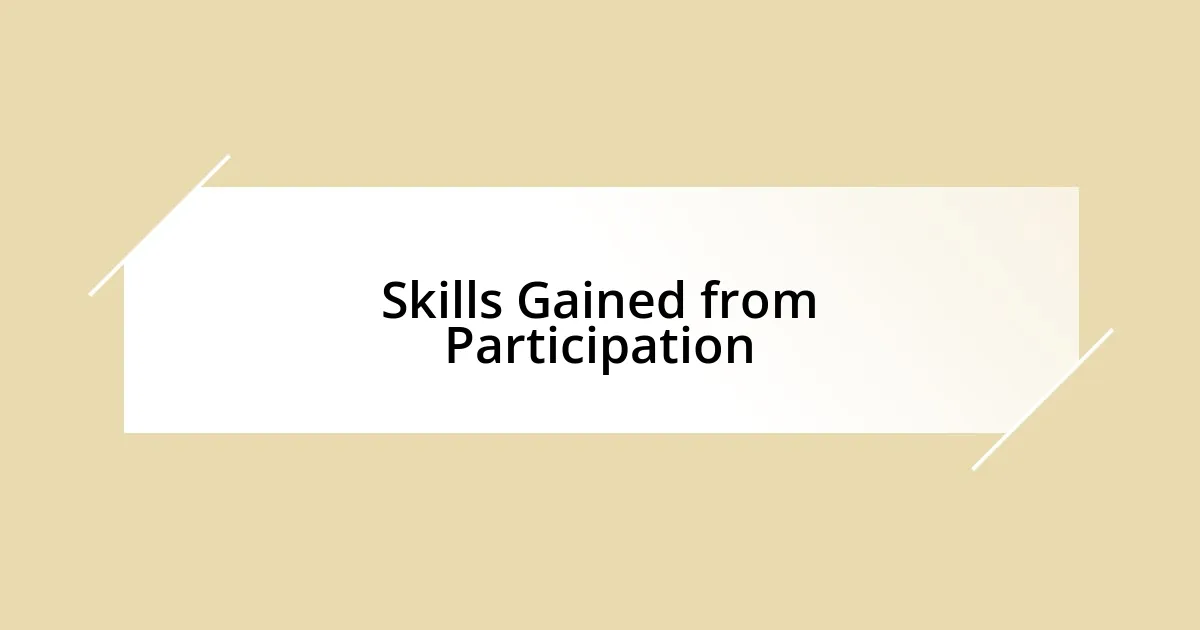
Skills Gained from Participation
Participating in town halls has honed my communication skills tremendously. I recall a particularly impactful meeting where I had the chance to articulate a concern about our local parks. As I spoke to the audience, I realized how vital it is to convey my message clearly and passionately. This process taught me how to craft my thoughts in a way that resonates with others, bridging the gap between my personal experiences and broader community concerns. Isn’t it fascinating how expressing our needs can cultivate a shared understanding?
Another skill that has flourished through these engagements is critical thinking. Each discussion presents multiple viewpoints, and I’ve learned to weigh them against my own beliefs. One time, after listening to a panel about housing policies, I found myself re-evaluating my stance based on the diverse opinions presented. This moment was enlightening; it reminded me of the importance of not just defending my perspective but also considering alternative solutions. How often do we challenge our views in everyday conversation?
Lastly, I’ve developed a deep sense of empathy through listening to fellow attendees share their stories. At one meeting, a woman described her struggles with affordable housing, and it left a lasting impression on me. Her vulnerability opened my eyes to experiences I had never encountered myself. This understanding drives me to advocate for policies that support the most vulnerable in our community. I often find myself pondering: what if we all took the time to listen and learn from one another? The growth that comes from these shared experiences is invaluable.
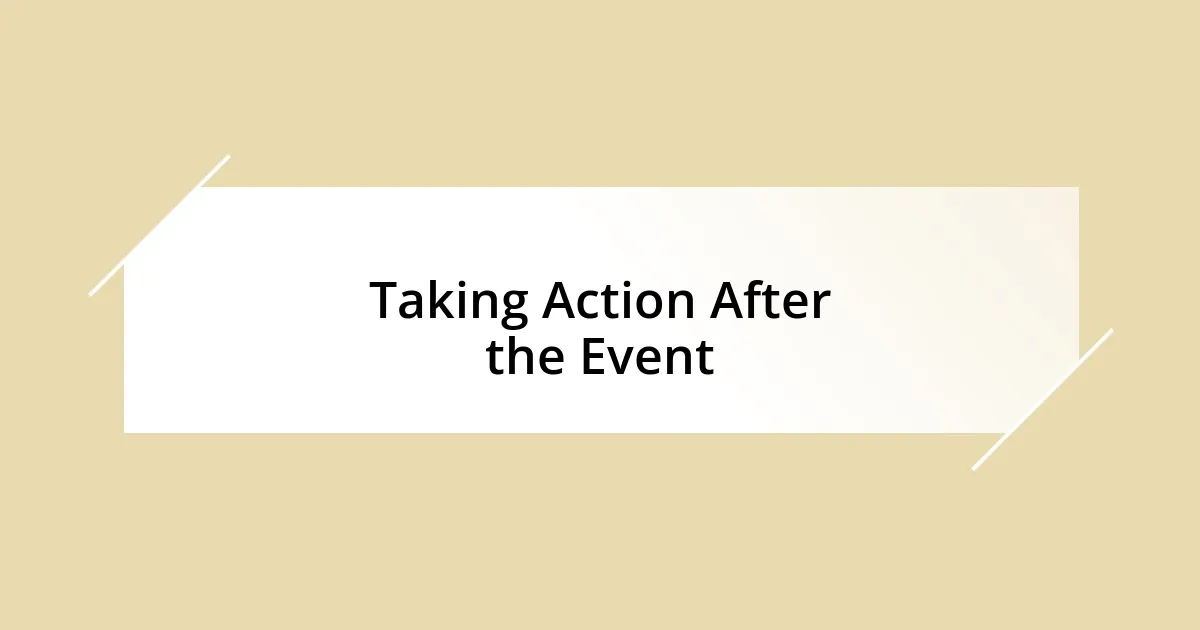
Taking Action After the Event
After attending a town hall, taking action can feel both energizing and daunting. I remember leaving one event with a fire in my belly, eager to turn my newfound insights into tangible change. That night, I drafted a detailed email to my local representative, outlining not only the concerns I had voiced but also potential solutions. This act of reaching out made me realize that my voice could influence policy, transforming my passion into a proactive dialogue.
One effective strategy I’ve adopted is to form small groups with fellow attendees for deeper discussions post-event. After a particularly eye-opening town hall on education reform, a few of us met at a local café. We brainstormed ways to engage our community, eventually organizing a petition that gathered over a hundred signatures. It was rewarding to see how collective action could amplify our individual concerns. Have you ever experienced that magic when a simple conversation spirals into something larger?
Reflecting on these experiences, I often remind myself that taking action isn’t just about pursuing grand initiatives. Sometimes, it’s the small steps that matter most. For instance, I began volunteering at a local nonprofit focused on providing resources for underserved youth. I was inspired to give back after hearing stories during a town hall that revealed the struggles of families in my area. This ongoing commitment has deepened my connection to my community in ways I hadn’t anticipated, making me wonder: how many lives can we touch by simply engaging with those around us?
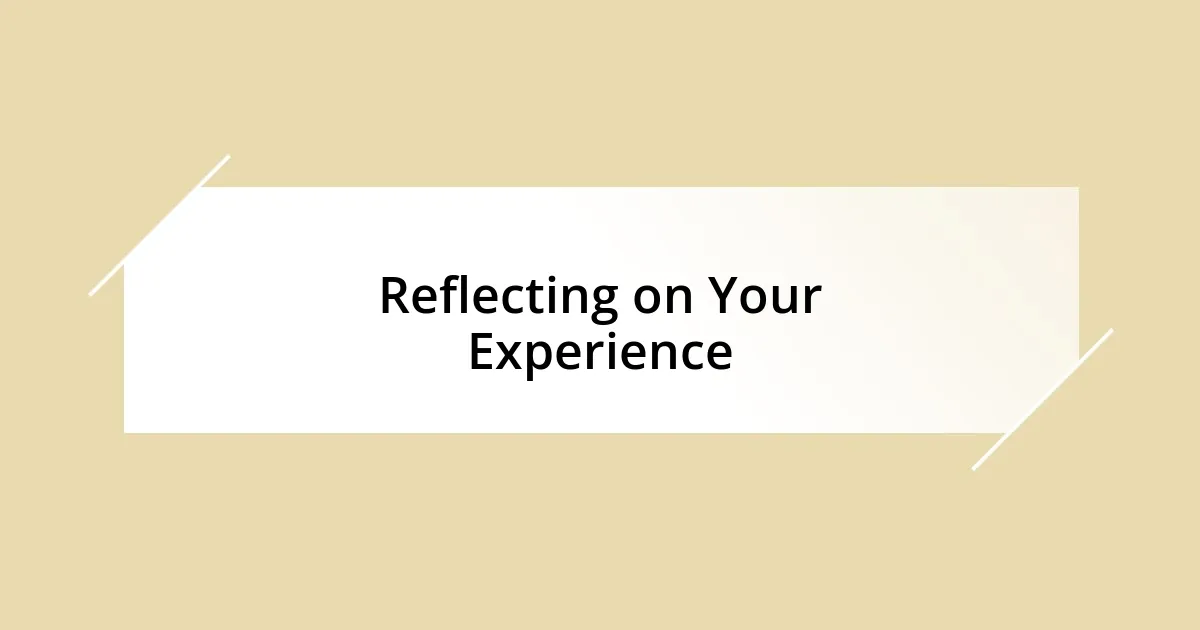
Reflecting on Your Experience
Reflecting on my experiences at town halls has often revealed layers of understanding I hadn’t previously recognized. For example, after one event, I found myself contemplating how my engagement had transformed my perspective on the issues discussed. It was a revelation when I realized that just by sharing my thoughts, I contributed to a larger dialogue. How often do we notice the ripple effect our voices can create in our communities?
As I look back on my participation, I’m struck by the connections I formed with others. At a town hall focused on environmental policies, I struck up a conversation with a young activist who shared her passion for sustainability. Her enthusiasm was contagious and made me reflect on my own responsibility toward our planet. Have you ever been inspired by a stranger’s determination to make a change? That moment motivated me to become more proactive about environmental issues in my everyday life.
Moreover, the emotional weight of sharing our experiences at these meetings often lingers long after the event ends. I recall a moment during a discussion on healthcare where a local resident candidly described her struggles with access to services. Listening to her story not only stirred compassion within me but also ignited a sense of urgency to advocate for change. What if we viewed these town halls as not just meetings, but as opportunities to forge meaningful connections? It’s these reflections that remind me to remain engaged and aware of the stories that shape our community.




